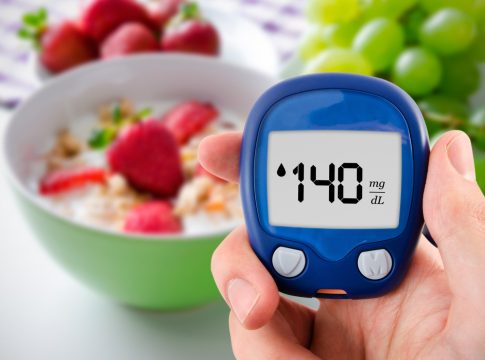Blood sugar, also known as blood glucose, is a vital energy source for your body. However, uncontrolled blood sugar levels can lead to serious health problems, particularly for people with diabetes.
This guide explores what blood sugar is, why it’s important to control it, and offers practical strategies you can implement to keep your blood sugar in a healthy range.
Understanding Blood Sugar
The body breaks down carbohydrates from food into glucose, which enters the bloodstream. Insulin, a hormone produced by pancreas, acts like a key, unlocking your cells and allowing glucose to enter for energy. When this system functions properly, blood sugar levels are kept in a healthy range. When the body doesn’t produce enough insulin or cells become resistant to its effects, blood sugar levels can rise unchecked. This can lead to a condition called hyperglycemia, which can cause a variety of unpleasant symptoms like fatigue, frequent urination, and increased thirst. Chronically high blood sugar can damage nerves and blood vessels throughout the body, potentially leading to complications like heart disease, stroke, kidney disease, and vision problems. Conversely, blood sugar levels can also dip too low (hypoglycemia), causing symptoms like shakiness, dizziness, and confusion.
Why Blood Sugar Control Matters
Maintaining healthy blood sugar levels is crucial for overall well-being and reduces the risk of developing serious health complications. It’s important to note that even if you don’t have diabetes, consistently high blood sugar levels can eventually lead to prediabetes, a condition that increases your risk of developing full-blown type 2 diabetes down the line.
Taking Charge of Your Blood Sugar
Here are key steps you can take to effectively manage your blood sugar:
- Monitor Your Blood Sugar: Regularly checking your blood sugar levels at home allows you to track trends and identify potential problems early on. Talk to your doctor about how often you should test and what readings are considered healthy for you. There are a variety of blood sugar monitors available, and some even connect to smartphones for easy data tracking.
- Diet for Success: Eating a balanced diet rich in fiber is essential. Fiber slows down digestion and carbohydrate absorption, preventing blood sugar spikes. Focus on whole grains, fruits, vegetables, and lean proteins. Limit processed foods, sugary drinks, and unhealthy fats, which can elevate blood sugar levels. Reading food labels and understanding carbohydrate content is key. Consulting a registered dietitian can help create a personalized meal plan that meets your specific needs and preferences. They can also provide guidance on portion control, an important aspect of blood sugar management.
- Move Your Body: Regular physical activity is a powerful tool for blood sugar control. Exercise helps your body use insulin more effectively and burns excess glucose for energy. Aim for at least 150 minutes of moderate-intensity exercise or 75 minutes of vigorous-intensity exercise per week. Even small bursts of activity throughout the day can make a difference. Find activities you enjoy, whether it’s brisk walking, swimming, cycling, or dancing.
- Maintain a Healthy Weight: Excess weight can contribute to insulin resistance, making it harder for your body to control blood sugar levels. Losing weight, even a modest amount, can significantly improve blood sugar management. Aim for gradual weight loss through a combination of healthy eating and regular exercise.
- Manage Stress: Chronic stress can raise blood sugar levels. Find healthy ways to manage stress, such as yoga, meditation, or deep breathing exercises. Relaxation techniques can help reduce stress hormones that can contribute to blood sugar imbalances.
- Develop Healthy Habits: Avoid smoking and excessive alcohol consumption, as both can negatively impact blood sugar control. Smoking damages blood vessels and can interfere with insulin function, while excessive alcohol intake can raise blood sugar levels or lead to hypoglycemia. Getting enough sleep is also crucial for blood sugar regulation. When you’re well-rested, your body is better able to manage insulin and blood sugar levels.
- Medications: If lifestyle changes alone aren’t enough, your doctor may prescribe medications like insulin or oral medications to help manage your blood sugar levels. It’s important to take your medication exactly as prescribed and attend follow-up appointments with your doctor to monitor your progress. There are different types of medications available, and your doctor will work with you to find the best option for your individual needs.
Remember:
- Blood sugar control is a continuous process. Work closely with your doctor to develop a personalized management plan that fits your lifestyle. Don’t be afraid to ask questions and express any concerns you may have.
- Don’t hesitate to seek help from your doctor or a registered dietitian if you have any questions or concerns about managing your blood sugar. They are there to support you on your journey to better health.
By following these strategies and working with your healthcare team, you can take control of your blood sugar and live a healthier life.
